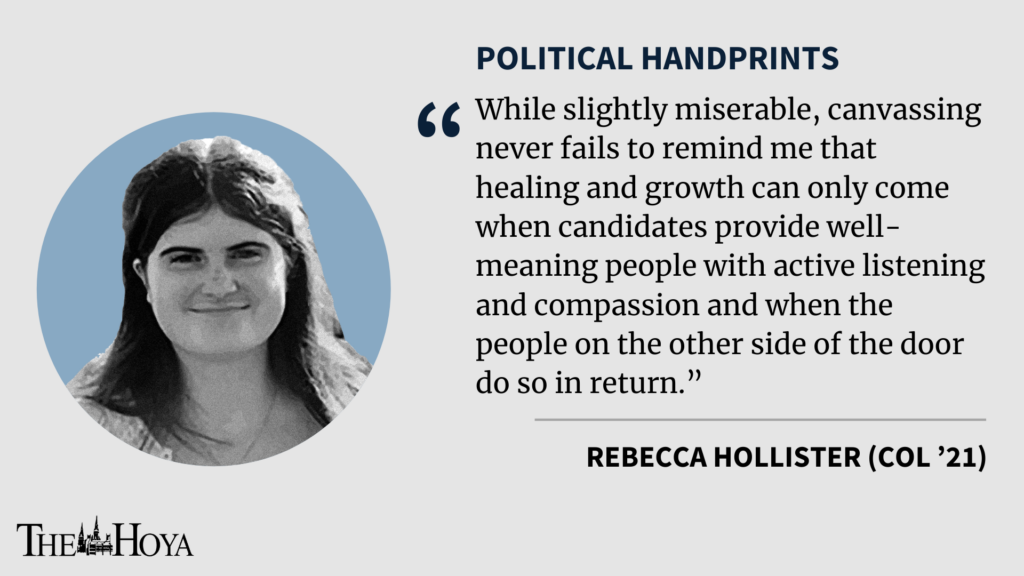If someone had told me that this summer I would be standing in the backyard of an elderly stranger who would ask me to feel his lymph nodes to prove he was having health problems his insurance would not address, I would guess that I would be canvassing. If someone had told me I would walk up to someone’s cracked open door, and they would immediately slam it in my face, or that I would hear five heartbreaking stories in a row about how the government is continuing to fail its citizens, or that I would have to run off someone’s yard at a moment’s notice to protect myself, I would say those things were just a normal part of going door-to-door. While slightly miserable, canvassing never fails to remind me that healing and growth can only come when candidates provide well-meaning people with active listening and compassion and when the people on the other side of the door do so in return. That sentiment has never been stronger than during this summer.
The intensity of local politics can match or even exceed that of national politics. People who have watched the show “Parks and Recreation” may wonder if the fictional citizens of Pawnee, Ind., are exaggerations of what happens in local politics. In my experience, they are not. Local politics can get extremely ugly, partially because the stakes are so high. National policy may not directly affect my neighbor, but a new pothole in the road, for example, will remind them of the failings of local infrastructure every single day. These challenges are why, on hard days when I’ve been on the receiving end of hateful comments at the door or on the phone, I reassure myself that the loathing isn’t personal. People have so many things to focus on, especially amid the COVID-19 pandemic, that it’s understandable they become angry when I attempt to put voting for my candidates higher on their priority list.
At the same time, I struggle with feeling discouraged and disheartened while campaigning. Very few people tell me about things their local government is doing right when I’m at their doorstep — after all, the point is to inform my candidates about what the issues are in the community. For every hateful comment I get, I’m lucky to get a comment about changes we could make that will impact the district. The price is steep for those productive conversations — I hear stories about lead poisoning, racism and relatives dying because of the lack of affordable healthcare in Kansas. Part of my job is teaching my candidates how to phrase their genuine responses to these concerns while also gauging support in an upcoming election.
The aforementioned elderly man, one of the nicest people I’ve encountered thus far, talked to us for nearly 20 minutes about how he was worried he was dying from pancreatic cancer since he could not get an appointment at the veterans’ center. He was dealing with something incredibly serious, and yet he still let us put a yard sign in his yard. He recognized the work we were trying to do, and because my candidate took the time out of his day to listen and then made sure to follow up with the man later, we were able to accomplish our goals: getting the man help and building knowledge and support for our campaign.
One thing I’ve noticed this summer, in particular, is that everyone is afraid. My candidates are afraid they won’t get elected and that we won’t be able to pass Medicaid expansion in Kansas. Our constituents are afraid for their families’ lives and their jobs. All this fear can make for an incredibly unpleasant interaction at the door, one in which candidates are dehumanized and the voter is reduced to a statistic, a number on my data sheet. That fear is why campaigns need to approach direct voter contact with the utmost compassion, and those on the other end of the phone or door should do the same.
To be clear, there is a time and a place for setting compassion aside and exchanging it for measured rage to help achieve a goal against truly horrible politicians and others. But when it comes to most local interactions between a volunteer for a candidate and a voter, each person is simply trying to better the world as they see fit. Compassion is what campaigns are missing — the ability to move forward without being insensitive. In order to show this level of kindness and understanding, we also need voters who are willing to open their doors and listen to their local candidates. If the saying “all politics are local” is true, we need to make sure we give local candidates the benefit of the doubt, so long as they are genuine and honest when talking to voters.
This will be my last Political Handprints column. I hope I was able to shed light on how local politics work, and, if anything, I hope I was able to convince readers of the importance of voting. Please cast your ballot Nov. 3. Many people are working incredibly hard to improve the political system even though it is solely an uphill battle. We need to support those who become politicians because of their good hearts, starting at the polls. Happy voting, and feel free to watch Leavenworth, Kan., on election night to see how my races turn out!
Rebecca Hollister is a senior in the College. Political Handprints appears online every other Sunday.














